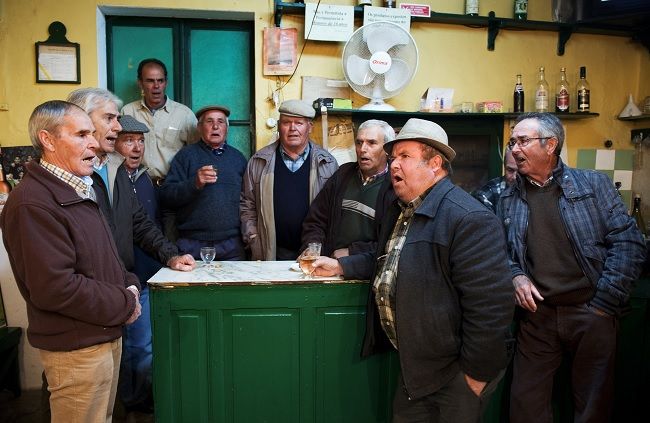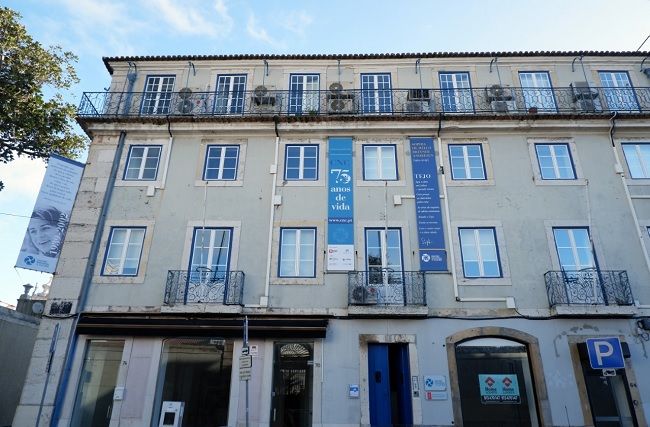Portugal visto por escritores estrangeiros
Fresh and New
by Donna Knipp

Men were singing. There was a group of them -- only men -- and they were singing in harmony. Woven together, their voices were buoyant and sturdy, like a raft I could hop on and ride down the current of the street.
This raft carried me toward Rossio Square, which is at the heart of old Lisbon, but it stopped a few blocks short of the square. The voices stopped. They had brought me here, to a street with no cars, lined with restaurants, which had vast flotillas of outdoor tables. This is sometimes called Lisbon’s “eating lane,” and it is hard to tell where one restaurant stops and another starts. Nearly all of the tables were occupied that evening, and the few that were not were pointed out to me and others passing by by the restaurant barkers. Every restaurant had one -- he held up his establishment’s menu and touted the food and the prices, in Portuguese and English.
The singers started again. I heard them but could not see them; there was no a stage. There were no performers per se. There was no logical place to look for them and it was getting harder to see in the growing dusk. Their songs were in Portuguese, without any kind of accompaniment -- polyphonic, a cappella. They had a quality that I remembered, but realized when I heard it that I had almost forgotten: they were personal, in the way that a letter is personal. They were sung by people who knew each other, who knew each other’s stories.
At last I saw them: at the back of one of the restaurants, standing in a circle. There were eight or nine of them. They were evidently employees of various restaurants who had come together to sing. Some of them were clearly waiters, dressed in white shirts and black vests, some were kitchen workers, with long white aprons that reached to their knees. They all looked older than thirty-five; some of them, a lot older. It was clear that they were not getting any money for their singing. They didn’t look at the tourists or diners, some of whom were listening to them quite closely. They looked only at each other.
I leaned in toward a woman sitting near them.
“Why are they singing?” I asked.
She understood, but needed a moment to translate the answer in her head into English.
“They are from Alentejo, in the south of Portugal,” she said after a long moment. “They sing for each other.”
That was the first I’d heard of Alentejo, though it would not be the last. It was clear, as I watched, that the woman had been right: these men were singing for one other. Standing in their circle, they looked at each other the whole time they sang, watching each other’s reactions, watching themselves in each other’s eyes.
The fact that were in the middle of a popular dining district on a busy summer evening mattered not at all. What mattered to them, clearly, was each other.
I listened for as long as I could; the songs were engaging and intense, though I could not understand the lyrics. Then I made my way back to my hotel, congratulating myself on having discovered something marvelous in the middle of Lisbon, where you stop expecting marvelous discoveries almost as soon as you arrive. It’s not that there is any lack of wonders in Lisbon – there is glorious food and drink and music and beaches – it’s that you will not be the one to unearth them. Someone will have gotten to it before you -- millions will have gotten to it first – and you have to be content with merely coming late to the party.
But the mysterious singing restaurant workers, who charged no money, hung out no sign, and seemed not to care whether they had an audience or not? I had stumbled on something fresh and new, I thought.
In my room, I opened up my laptop and typed “Alentejo singing.” I saw I had not only been wrong about having discovered something, I had been idiotically wrong. The restaurant workers’ singing has a formal name -- “Cante Alentejano” – and it is a famous kind of folk music particular to the Alentejo region of Portugal. It has been recorded and studied for decades and turned into the subject of numerous films and videos. There are enough recordings of it online that it is easy to get a good idea of the look and sound of Cante, as it is commonly called, although that is not as much fun as stumbling across it accidentally in the street.
Cante is not so famous as Fado, the often melancholy Portuguese music sung by brooding chanteuses in restaurants and bars all around Lisbon, for which people pay steep cover charges. But Cante is famous enough to have been designated by the United Nations’ cultural agency (UNESCO) as an example of the “intangible cultural hertage of humanity,” and I did find a brief mention of it in a popular guidebook, which advises readers to find a tavern “frequented by locals” and to hang out there until people have had a few drinks, when they will supposedly, irrepressibly, start singing.
Which raises an interesting point: is there any place in America where you can go to hear the locals singing to each other? Certainly there are places where people sit or stand side-by-side and sing: at the ballgame, for instance, or in church, in a car on a roadtrip or yes, in a bar after they’ve had a few drinks. But that is not what I saw the Cante singers do. They were singing for each other, as the woman at the restaurant had told me. They were looking at each other as they sang, and this gave their songs a poignant quality they would not otherwise have had.
Perhaps the issue is that America is not old enough; Cante’s roots are said to be in Gregorian chants, or in Arabic singing, both of which go back many centuries. Or perhaps America is not serious enough; Cante lyrics often deal with hardship, or the loss of crops, or other forms of livelihood. It’s hard to imagine a bunch of guys at the Cincinnati VFW, say, crooning to each other about how their granddaddys lost their farms. They might make wonderful Cante singers, those guys at the VFW; I’m sure they have stories locked away in their memories that could be turned into beautiful songs.
Perhaps a cultural exchange could be set up, between the old guys of Alentejo and the old guys of Cincinnati, and they could meet somewhere and sing to each other. Or rather, for each other. They could stand in a big circle and look into each other’s eyes and sing all the stories they know about their grandfathers and what they lost. I expect the stories would be remarkably similar, but the discovery of that fact, at least to anyone there listening, would be fresh and new.
Donna Knipp is a retired business journalist. Her short play, "I Don't Remember," was selected for a reading at the Barrow Group Theater in New York. She is at work on a novel.


 Divulgue aqui os seus eventos
Divulgue aqui os seus eventos














